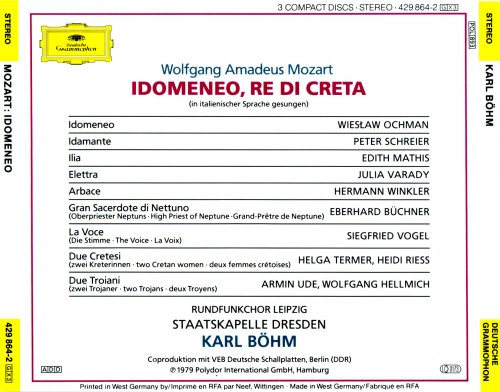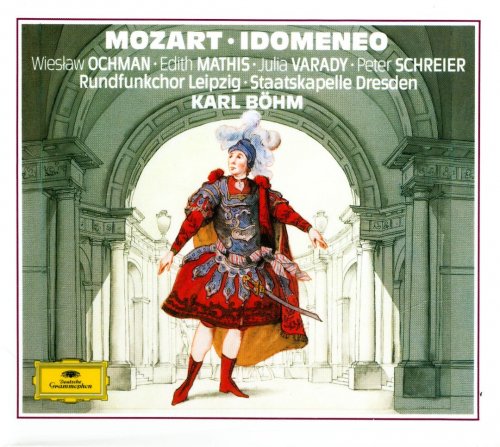
Karl Böhm - Mozart: Idomeneo (1990)
BAND/ARTIST: Karl Böhm, Staatskapelle Dresden
- Title: Mozart: Idomeneo
- Year Of Release: 1990
- Label: Deutsche Grammophon
- Genre: Classical
- Quality: FLAC (image + .cue, log, artwork)
- Total Time: 02:46:03
- Total Size: 736 MB
- WebSite: Album Preview
Tracklist:
CD 1
01. Ouverture
Act 1
02. Ilia: Quando avran fine omai l'aspre sventure mie?
03. Ilia: Padre, germani, addio!
04. Idamante: Radunate i Troiani, ite, e la corte sia pronta questo giorno a cele...
05. Idamante: Non ho colpa, e mi condanni
06. Ilia,Idamante: Ecco il misero resto dei Troiani
07. Tutti: Godiam la pace.trionfi Amore
08. Elettra: Prence, signor, tutta la Grecia oltraggi; tu proteggi il nemico
09. Ilia, Eletttra: Dell'Asia i danni
10. Elettra: Tutte nel cor vi sento
11. Coro Vicino: Pieta! Numi, pieta!
12. Idomeneo: Eccoci salvi alfin
13. Idomeneo: Vedrommi intorno
14. Idomeneo: Cieli! che veggo!
15. Idamante: Il padre adorato
16. Marcia
17. Tutti: Nettuno s'onori!
CD 2
Act 2
01. Recitativo ''Siam soli; odimi Arbace'' (Idomeneo, Arbace)
02. Recitativo ''Non piu. Tutto ascoltai'' (Ilia, Idamante)
03. Rondo ''Non temer, amato bene'' (Idamante)
04. Recitativo ''Se mai pomposo apparse'' (Ilia, Idamante)
05. N.11 Aria ''Se il padre perdei'' (Ilia)
06. Recitativo ''Qual mi conturba i sensi'' (Idomeneo)
07. N.12b Aria ''Fuor del mar ho un mar in seno'' (Idomeneo)
08. Recitativo ''Chi mai del mio provo piacer piu dolce!'' (Elettra)
09. N.13 Aria ''Idol mio, se ritroso'' (Elettra)
10. N.14 Marcia e Recitativo ''Odo da lunge armonioso suono'' (Elettra)
11. Recitativo ''Sidonie sponde'' (Elettra)
12. N.15 Coro '' Placido e il mar'' (Coro, Elettra). Recitativo ''Vatte...
13. N.16 Terzetto ''Pria di partir, o Dio!'' (Idamante, Elettra, Idomeneo)
14. N.17 Coro ''Qual nuovo terrore!''
15. Recitativo ''Eccoti in me, barbaro Nume! il reo!'' (Idomeneo)
16. Coro ''Corriamo, fuggiamo''
CD 3
Act 3
01. Ilia: Solitudini amiche, aure amorose, piante fiorite e fiori vaghi!
02. Ilia: Zeffiretti lusinghieri
03. Idamante: Principessa, a tuoi sguardi offrirmi ardisco ancor
04. Ilia: Spiegarti non poss'io
05. Idomeneo: Ciele! che vedo?
06. Idamante,Ilia,Idomeneo,Elettra:Andro ramingo e solo
07. Arbace: Sire, alla reggia tua immensa turba di popolo
08. Arbace: Sventurata Sidon!
09. Arbace: Se cola ne' fati e scritto
10. Gran Sacerdote: Volgi intorno lo sguardo, o Sire, e vedi qual srage
11. Popolo: O voto tremendo!
12. Marcia
13. Idomeneo: Accogli, o re del mar
14. Idomeneo: Qual risuona qui intorno applauso di vittoria?
15. Idamante: Padre, mio caro padre!
16. La Voce: Idomeneo cessi esser re
17. Elettra: D'Oreste d d'Aiace
18. Idomeneo: Popoli! A voi l'ultima legge impone Idomeneo qual re
19. Coro: Scenda Amor, scenda Imeneo

CD 1
01. Ouverture
Act 1
02. Ilia: Quando avran fine omai l'aspre sventure mie?
03. Ilia: Padre, germani, addio!
04. Idamante: Radunate i Troiani, ite, e la corte sia pronta questo giorno a cele...
05. Idamante: Non ho colpa, e mi condanni
06. Ilia,Idamante: Ecco il misero resto dei Troiani
07. Tutti: Godiam la pace.trionfi Amore
08. Elettra: Prence, signor, tutta la Grecia oltraggi; tu proteggi il nemico
09. Ilia, Eletttra: Dell'Asia i danni
10. Elettra: Tutte nel cor vi sento
11. Coro Vicino: Pieta! Numi, pieta!
12. Idomeneo: Eccoci salvi alfin
13. Idomeneo: Vedrommi intorno
14. Idomeneo: Cieli! che veggo!
15. Idamante: Il padre adorato
16. Marcia
17. Tutti: Nettuno s'onori!
CD 2
Act 2
01. Recitativo ''Siam soli; odimi Arbace'' (Idomeneo, Arbace)
02. Recitativo ''Non piu. Tutto ascoltai'' (Ilia, Idamante)
03. Rondo ''Non temer, amato bene'' (Idamante)
04. Recitativo ''Se mai pomposo apparse'' (Ilia, Idamante)
05. N.11 Aria ''Se il padre perdei'' (Ilia)
06. Recitativo ''Qual mi conturba i sensi'' (Idomeneo)
07. N.12b Aria ''Fuor del mar ho un mar in seno'' (Idomeneo)
08. Recitativo ''Chi mai del mio provo piacer piu dolce!'' (Elettra)
09. N.13 Aria ''Idol mio, se ritroso'' (Elettra)
10. N.14 Marcia e Recitativo ''Odo da lunge armonioso suono'' (Elettra)
11. Recitativo ''Sidonie sponde'' (Elettra)
12. N.15 Coro '' Placido e il mar'' (Coro, Elettra). Recitativo ''Vatte...
13. N.16 Terzetto ''Pria di partir, o Dio!'' (Idamante, Elettra, Idomeneo)
14. N.17 Coro ''Qual nuovo terrore!''
15. Recitativo ''Eccoti in me, barbaro Nume! il reo!'' (Idomeneo)
16. Coro ''Corriamo, fuggiamo''
CD 3
Act 3
01. Ilia: Solitudini amiche, aure amorose, piante fiorite e fiori vaghi!
02. Ilia: Zeffiretti lusinghieri
03. Idamante: Principessa, a tuoi sguardi offrirmi ardisco ancor
04. Ilia: Spiegarti non poss'io
05. Idomeneo: Ciele! che vedo?
06. Idamante,Ilia,Idomeneo,Elettra:Andro ramingo e solo
07. Arbace: Sire, alla reggia tua immensa turba di popolo
08. Arbace: Sventurata Sidon!
09. Arbace: Se cola ne' fati e scritto
10. Gran Sacerdote: Volgi intorno lo sguardo, o Sire, e vedi qual srage
11. Popolo: O voto tremendo!
12. Marcia
13. Idomeneo: Accogli, o re del mar
14. Idomeneo: Qual risuona qui intorno applauso di vittoria?
15. Idamante: Padre, mio caro padre!
16. La Voce: Idomeneo cessi esser re
17. Elettra: D'Oreste d d'Aiace
18. Idomeneo: Popoli! A voi l'ultima legge impone Idomeneo qual re
19. Coro: Scenda Amor, scenda Imeneo

Karl Böhm was one of the greatest conductors of the twentieth century in the German tradition. He studied music as a child and continued to work and study in music while serving in the Austrian Army during World War I -- and while completing a doctorate in law. He coached singers at the Graz Opera and was permitted to conduct a performance of Nessler's Der Trompeter von Sackingen. He never had conducting lessons, but made close studies of the work of both Bruno Walter and Carl Muck.
In 1921 he was hired by the Bavarian State Opera in Munich, and then he became Generalmusikdirektor in both Darmstadt (1927) and Hamburg (1931-1933). He gained a reputation for his fine performances of Mozart, Wagner, and Richard Strauss, as well as his championing of modern German music, including operas by Krenek and Berg. Böhm debuted in Vienna in 1933, leading Wagner's Tristan und Isolde. In 1934 he became director of the Dresden State Opera, Richard Strauss's favorite theater. There, Böhm conducted premieres of Strauss's Die schweigsame Frau (1935) and Dafne (1938). He remained at the helm in Dresden through 1943, at which point he became director of the Vienna State Opera (1943-1945). Richard Strauss was not in official favor, and Joseph Goebbels banned any recognition of the great composer's 80th birthday in 1944. However, Böhm participated in a de facto observance, as a large number of Strauss's orchestral and operatic works "just happened" to be played about the time of the birthday.
After the war, Böhm was forbidden to perform until he underwent "de-Nazification," a procedure whereby prominent Austro-Germans were investigated for complicity in Nazi crimes. He was eventually cleared of any suspicion, and was permitted to resume work in 1947.
Böhm oversaw the German repertory at the Teatro Colón in Buenos Aires (1950-1953), and again served as director of the Vienna State Opera (1954-1956). He debuted in the USA at New York's Metropolitan Opera with Mozart's Don Giovanni in 1957, and took prominent German orchestras and opera companies on tour. The Vienna Philharmonic bestowed on him the title "Ehrendirigent," and he was proclaimed Generalmusikdirector of Austria. He left a legacy of many great recordings, including a complete Wagner Ring cycle considered by many critics to be the best. While his Wagner and Strauss were sumptuously Romantic, his Mozart was scrupulously Classical in approach. -- Joseph Stevenson
In 1921 he was hired by the Bavarian State Opera in Munich, and then he became Generalmusikdirektor in both Darmstadt (1927) and Hamburg (1931-1933). He gained a reputation for his fine performances of Mozart, Wagner, and Richard Strauss, as well as his championing of modern German music, including operas by Krenek and Berg. Böhm debuted in Vienna in 1933, leading Wagner's Tristan und Isolde. In 1934 he became director of the Dresden State Opera, Richard Strauss's favorite theater. There, Böhm conducted premieres of Strauss's Die schweigsame Frau (1935) and Dafne (1938). He remained at the helm in Dresden through 1943, at which point he became director of the Vienna State Opera (1943-1945). Richard Strauss was not in official favor, and Joseph Goebbels banned any recognition of the great composer's 80th birthday in 1944. However, Böhm participated in a de facto observance, as a large number of Strauss's orchestral and operatic works "just happened" to be played about the time of the birthday.
After the war, Böhm was forbidden to perform until he underwent "de-Nazification," a procedure whereby prominent Austro-Germans were investigated for complicity in Nazi crimes. He was eventually cleared of any suspicion, and was permitted to resume work in 1947.
Böhm oversaw the German repertory at the Teatro Colón in Buenos Aires (1950-1953), and again served as director of the Vienna State Opera (1954-1956). He debuted in the USA at New York's Metropolitan Opera with Mozart's Don Giovanni in 1957, and took prominent German orchestras and opera companies on tour. The Vienna Philharmonic bestowed on him the title "Ehrendirigent," and he was proclaimed Generalmusikdirector of Austria. He left a legacy of many great recordings, including a complete Wagner Ring cycle considered by many critics to be the best. While his Wagner and Strauss were sumptuously Romantic, his Mozart was scrupulously Classical in approach. -- Joseph Stevenson
Classical | FLAC / APE | CD-Rip
As a ISRA.CLOUD's PREMIUM member you will have the following benefits:
- Unlimited high speed downloads
- Download directly without waiting time
- Unlimited parallel downloads
- Support for download accelerators
- No advertising
- Resume broken downloads


